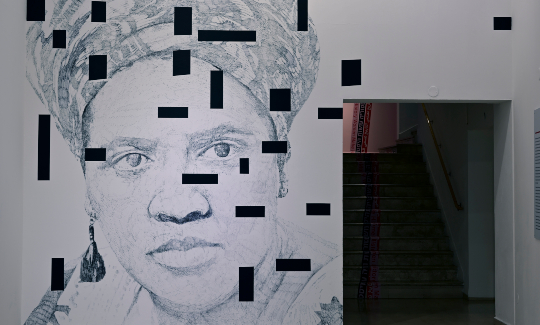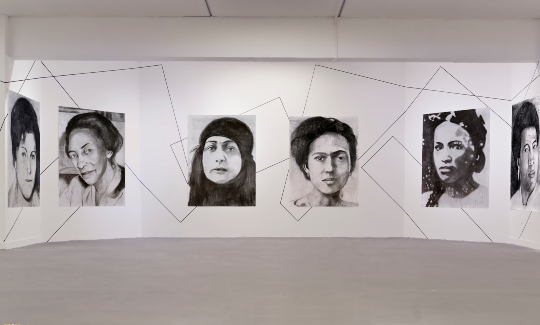"Iris Kensmil: The New Utopia Begins Here #2"
Saturday, 21.12.19, 20:00
Saturday, 01.08.20
:
Svetlana Reingold
More info:
04-6030800Iris Kensmil's exhibition is part of a project that represented the Netherlands in 2019 at the Venice Biennale. In many senses the Biennale is an important arena for defining the place of art in the context of ideas of citizenship and (trans-)nationality. The whole exhibition there, called The Measurement of Presence which included beside her also Remy Jungerman,called for the development of an alternative, transnational vision, based on the awareness we are today living in a condition of perpetual flow and change.
Many of Kensmil's projects are based on murals that depict historical figures, with reference to the model of historical painting. English painter Joshua Reynolds, who created this model, called it "the most important form of art," intended to represent an abstract conception and sublime values rather than the private individual. Kensmil describes her research, which is based on a collection of images from different sources, as an inseparable part of her artistic approach: "At some point one image or another comes back to me, so I search for it and turn it into a painting."
The heroine of the installation exhibited here is Audre Lorde (1934-1992) – an American writer, poet, and social activist, originally from the Caribbean. Lorde was also a feminist and a lesbian. As part of the "black feminism" she developed, she criticized the liberal feminists of the 1960s and their focus on white, middle-class women. In her essay "The Master's Tools Will Never Dismantle the Master's House" (1984), Lorde discussed the racism inherent in the feminist movement, calling for a focus on the differences between groups of women and on conflicting impulses within the individual. According to Lorde, this shift in focus could enable the accumulation of the power necessary to truly "dismantle the master's house." Without a community there is no freedom and no future – only a temporary ceasefire between woman and her oppressors.
Kensmil emphasizes that "images of black liberation are powerful for me. When I think of myself as a black woman I think of liberation. Liberation is part of my personal history. This is a beautiful history that includes terrible aspects, and it fascinates me." Her paintings are based on the visual force of tonality. In her words, "I do not want to be distracted by color, since colors are related to each other as a form of personal expression."
Kensmil's works are rooted in postcolonial feminist discourse, which argues that feminism can itself become an imperialist strategy if it only promotes the interests of "privileged" women. Postcolonial feminism calls for a comprehensive study of the Third World and the Afro-American resistance movements of the 1960s and 1970s. Non-whiteness has connected between women of different races, creating one political status of "black women" facing the white hegemony.
The research field of Afro-American culture coined the term "recoding blackness." Kensmil works in line with "non-white" feminists who define their identity in light of the wounds they have sustained. For them there is more than one kind of feminism, just as there is more than one kind of patriarchy.
Iris Kensmil was born in the Netherlands in 1970. She lives and works in Amsterdam, the Netherlands
Supported by Mondriaan Fund, the public cultural funding organization focusing on visual art and cultural heritage



